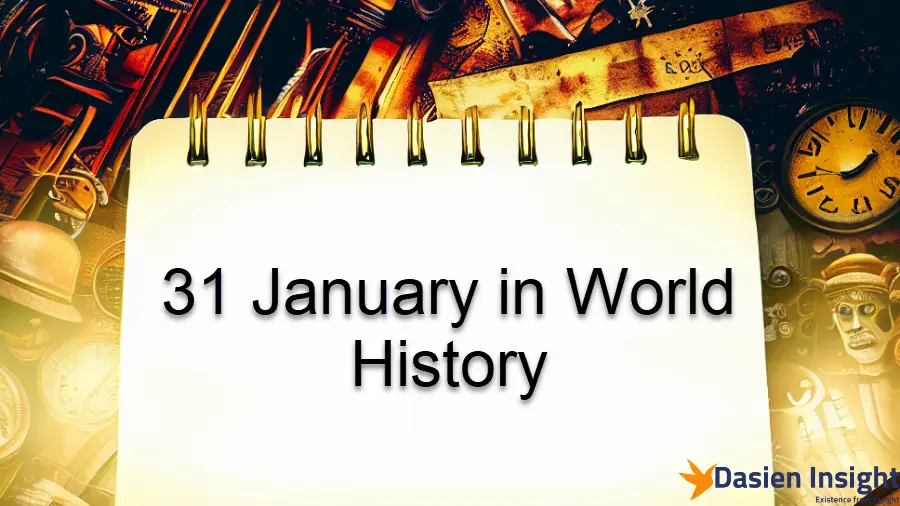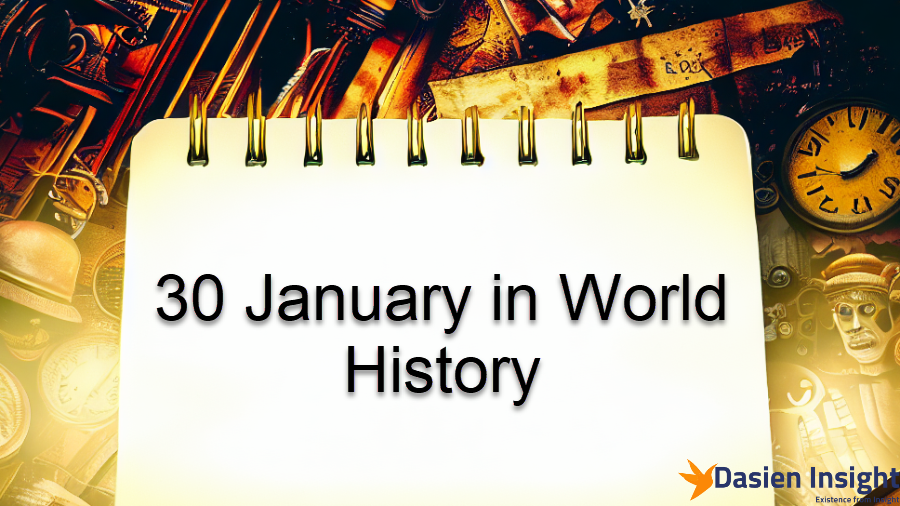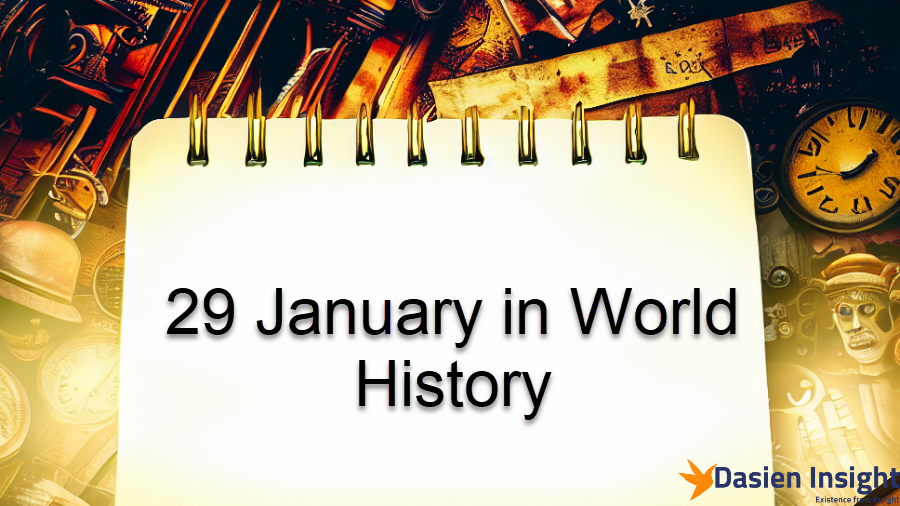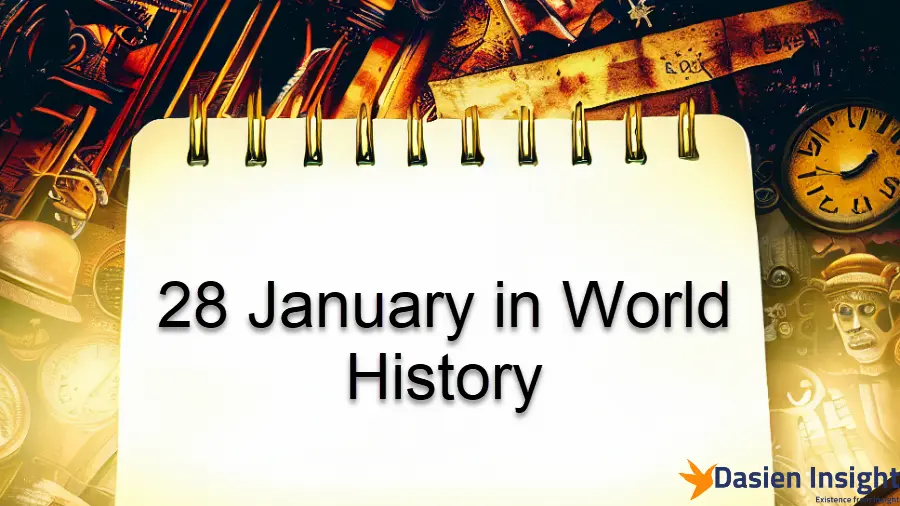23 January in World History
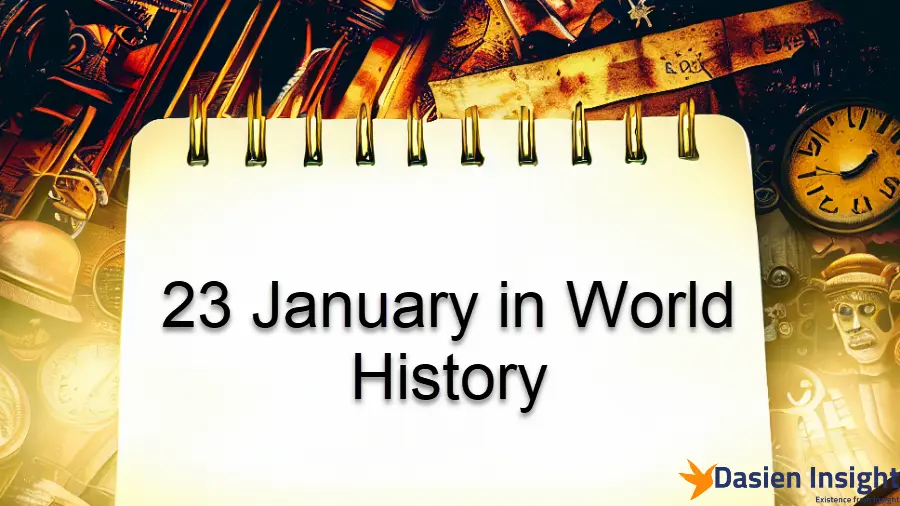
[et_pb_section fb_built=”1″ _builder_version=”4.21.0″ _module_preset=”default” custom_padding=”0px||||false|false” global_colors_info=”{}”][et_pb_row _builder_version=”4.21.0″ _module_preset=”default” width=”100%” global_colors_info=”{}”][et_pb_column type=”4_4″ _builder_version=”4.21.0″ _module_preset=”default” global_colors_info=”{}”][et_pb_text _builder_version=”4.21.0″ _module_preset=”default” hover_enabled=”0″ global_colors_info=”{}” sticky_enabled=”0″]
Historical events shape the course of civilization and provide insights into our past. January 23rd has witnessed numerous significant events throughout history, as well as the birth and death anniversaries of famous personalities. In this article, we will about the Important Events of 23 January in World History, highlighting their impact on the world, and also acknowledge the notable individuals associated with this date.
[/et_pb_text][et_pb_text _builder_version=”4.21.0″ _module_preset=”default” header_2_font=”|||on|||||” header_2_text_align=”center” use_background_color_gradient=”on” background_color_gradient_stops=”rgba(48,232,242,0.79) 0%|rgba(199,51,244,0.79) 99%” custom_margin=”-13px|||||” global_colors_info=”{}”]
Famous People Born on 23 January
[/et_pb_text][et_pb_text _builder_version=”4.21.0″ _module_preset=”default” background_color=”#eaeaea” custom_padding=”6px|2px||2px|false|false” global_colors_info=”{}”]
People born on January 23rd epitomize the term “idealists,” displaying unwavering willpower and determination to shape their lives according to their own vision. They possess a remarkable capacity for innovation and adaptability, seeking to meet their own expectations for a fulfilling existence. While they may be moderately sociable, their loyalty knows no bounds once they form a genuine friendship. Here is the List of Famous People Born On 23 January:
- Édouard Manet (23/01/1832): French painter and a pivotal figure in the transition from Realism to Impressionism. He is known for his innovative approach to composition and subject matter in paintings such as “Olympia” and “Le Déjeuner sur l’herbe.”
- Subhas Chandra Bose (23/01/1897): Indian nationalist and political leader. He played a key role in the Indian independence movement against British rule and was the founder of the Forward Bloc. Bose is often referred to as Netaji (“Respected Leader”) in India.
- John Hancock (23/01/1737): American statesman and Founding Father. He was the president of the Second Continental Congress and is best known for his prominent signature on the United States Declaration of Independence.
- Django Reinhardt (23/01/1910): Belgian-born French jazz guitarist and composer. Reinhardt was one of the pioneers of European jazz and is regarded as one of the greatest guitarists of all time. His distinctive style blended traditional jazz with Romani (Gypsy) music.
- Stendhal (23/01/1783): French writer and one of the first practitioners of literary realism. He is known for his novels “The Red and the Black” and “The Charterhouse of Parma,” which explore the psychological and social aspects of love and ambition.
- Alfred Denning, Baron Denning (23/01/1899): British lawyer and judge. He served as Master of the Rolls and later as a Law Lord in the House of Lords. Denning made significant contributions to English law and is known for his judgments and legal writings.
- Arjen Robben (23/01/1984): Dutch professional footballer who played as a winger. He had a successful career at clubs like Chelsea, Real Madrid, and Bayern Munich, winning numerous domestic and international titles.
- Biligtü Khan Ayushiridara (23/01/1340): Mongol emperor who ruled as the third emperor of the Yuan dynasty in China. He is known for his military campaigns and for consolidating Mongol rule over China.
- John Browning (23/01/1855): American firearms designer who is regarded as one of the most influential gunsmiths in history. He designed numerous iconic firearms, including the Browning Hi-Power and the Browning Automatic Rifle (BAR).
- Saigō Takamori (23/01/1828): Japanese samurai and leader of the Satsuma Rebellion against the Meiji government. He is remembered as a legendary figure in Japanese history and for his role in the end of the samurai era.
- Potter Stewart (23/01/1915): American lawyer and associate justice of the Supreme Court of the United States. He served on the Court from 1958 to 1981 and played a significant role in shaping constitutional law during his tenure.
- Derek Walcott (23/01/1930): Saint Lucian poet and playwright. He won the Nobel Prize in Literature in 1992 and is known for his epic poem “Omeros” and his exploration of Caribbean identity and postcolonial themes.
- Marija Gimbutas (23/01/1921): Lithuanian-American archaeologist and anthropologist known for her research on the Neolithic and Bronze Age cultures of Europe. She is particularly noted for her theories on the prehistoric origins of the Indo-European culture and the worship of the goddess.
- Rutger Hauer (23/01/1944): Dutch actor known for his roles in films such as “Blade Runner,” “The Hitcher,” and “Soldier of Orange.” Hauer’s distinctive presence and versatile acting skills made him a prominent figure in international cinema.
- David Arnold (23/01/1962): English film composer known for his work on the James Bond film series, including the scores for “Tomorrow Never Dies,” “The World Is Not Enough,” and “Casino Royale.”
- Megawati Sukarnoputri (23/01/1947): Indonesian politician who served as the fifth President of Indonesia from 2001 to 2004. She is the daughter of Indonesia’s first president, Sukarno, and played a significant role in Indonesian politics.
- Antonio Villaraigosa (23/01/1953): American politician and former mayor of Los Angeles. Villaraigosa served as the 41st mayor of Los Angeles from 2005 to 2013 and was the first Hispanic mayor of the city in over 130 years.
- Jože Plečnik (23/01/1872): Slovene architect known for his distinctive architectural style, which combined elements of modernism with historical and classical influences. He left a significant mark on the cityscape of Ljubljana, Slovenia’s capital.
- Paul Langevin (23/01/1872): French physicist and prominent figure in the development of quantum mechanics. He made important contributions to the understanding of magnetism and the theory of relativity.
- Frank Lautenberg (23/01/1924): American politician and businessman who served as a United States Senator from New Jersey. He was known for his advocacy on environmental and public health issues during his time in the Senate.
- Jeanne Moreau (23/01/1928): French actress, singer, and director. She was a prominent figure in French cinema and known for her roles in films such as “Jules et Jim” and “Elevator to the Gallows.”
- Randolph Scott (23/01/1898): American film actor known for his roles in Western films. He appeared in numerous successful Westerns throughout his career, becoming one of the genre’s iconic figures.
- Gary Burton (23/01/1943): American jazz vibraphonist and composer. He is known for his innovative playing style and collaborations with various jazz musicians, including Chick Corea and Pat Metheny.
- Patriarch Sergius of Moscow (23/01/1867): Russian Orthodox bishop who served as the 13th Patriarch of Moscow and All Russia. He played a crucial role in the revival of the Russian Orthodox Church during the Soviet era.
[/et_pb_text][et_pb_text _builder_version=”4.21.0″ _module_preset=”default” header_2_font=”|||on|||||” header_2_text_align=”center” use_background_color_gradient=”on” background_color_gradient_stops=”rgba(48,232,242,0.79) 0%|rgba(199,51,244,0.79) 99%” global_colors_info=”{}”]
Famous People Died on 23 January
[/et_pb_text][et_pb_text _builder_version=”4.21.0″ _module_preset=”default” custom_margin=”||-1px|||” custom_padding=”|2px||2px|false|false” global_colors_info=”{}”]
Honoring the memory of renowned individuals, we commemorate the lives of Famous People Died on 23 January:
- Larry King (1933-2021) – American TV show host known for hosting “Larry King Live,” a long-running talk show.
- Salvador Dalí (1904-1989) – Spanish surrealist painter known for his distinctive and imaginative artworks.
- Johnny Carson (1925-2005) – American TV show host and comedian, best known as the host of “The Tonight Show Starring Johnny Carson.”
- Anna Pavlova (1881-1931) – Russian ballerina widely regarded as one of the greatest classical ballet dancers in history.
- Abdullah bin Abdulaziz Al Saud (1924-2015) – King of Saudi Arabia from 2005 until his death.
- Gorden Kaye (1941-2017) – British TV actor known for his role as René Artois in the sitcom “‘Allo ‘Allo!”
- Edvard Munch (1863-1944) – Norwegian painter and printmaker known for his iconic work “The Scream.”
- Hal Holbrook (1925-2021) – American TV actor known for his portrayal of Mark Twain in his one-man show “Mark Twain Tonight!”
- Nell Carter (1948-2003) – American stage actress and singer, best known for her role in the Broadway musical “Ain’t Misbehavin’.”
- Justin Carmical (1971-2014) – American YouTube star known for his internet persona “JewWario” and his contributions to gaming-related content.
- Ernie Banks (1931-2015) – American baseball player, known as “Mr. Cub,” who played his entire career with the Chicago Cubs.
- Thierry Mugler (1948-2022) – French fashion designer known for his avant-garde designs and theatrical runway shows.
- Lily Douglas (2007-2022) – British Instagram star and cancer awareness advocate.
- Paul Robeson (1898-1976) – American stage actor, singer, and civil rights activist.
- Oliver Mtukudzi (1952-2019) – Zimbabwean reggae singer, songwriter, and guitarist.
- Song Yoo-jung (1994-2021) – South Korean TV actress known for her roles in dramas like “School 2017” and “Make Your Wish.”
- Mohammad Ali Bogra (1909-1963) – Pakistani politician who served as the Prime Minister of Pakistan from 1953 to 1955.
- Samuel Barber (1910-1981) – American composer known for his classical compositions, including “Adagio for Strings.”
- Hugh Masekela (1939-2018) – South African jazz trumpeter, flugelhornist, and composer.
- Jim Lehrer (1934-2020) – American journalist and news anchor, best known as the longtime host of “The MacNeil/Lehrer Report.”
- Bob Keeshan (1927-2004) – American TV actor and children’s entertainer, best known as the creator and host of “Captain Kangaroo.”
- Allen Collins (1952-1990) – American guitarist and songwriter, a founding member of the rock band Lynyrd Skynyrd.
- John Field (1782-1837) – Irish composer and pianist known for his nocturnes, which influenced Frédéric Chopin.
- Terry Kath (1946-1978) – American guitarist and singer, a founding member of the rock band Chicago.
- Lee O’Denat (1974-2017) – American entrepreneur and founder of the website WorldStarHipHop.
- Jack LaLanne (1914-2011) – American entrepreneur and fitness expert known as the “Godfather of Fitness.”
- Lari Michele White (1965-2018) – American country singer-songwriter known for her hit songs like “That’s My Baby” and “Now I Know.”
- George Miller Beard (1839-1883) – American physician and neurologist, known for his work on neurasthenia.
- Oliver Smith (1918-1994) – American production designer and scenic designer for theater and film.
- Joel Taylor (1979-2018) – American meteorologist and storm chaser, known for his appearances on the TV show “Storm Chasers.”
- Willie Edwards (1932-1957) – African American man whose racially motivated murder became a significant civil rights case.
- Muhammad Ali Bogra (1909-1963) – Pakistani politician who served as the Prime Minister of Pakistan from 1953 to 1955.
- Jack Oakie (1903-1978) – American movie actor known for his roles in films like “The Great Dictator” and “Once in a Lifetime.”
- Barrie Ingham (1932-2015) – English stage actor known for his portrayal of Captain Hook in the musical “Peter Pan.”
- Nicanor Parra (1914-2018) – Chilean poet and physicist, known for his innovative and influential work in Spanish literature.
- Rafael Bordalo Pinheiro (1846-1905) – Portuguese illustrator and humorist, known for his satirical drawings and caricatures.
- Robert Nozick (1938-2002) – American philosopher known for his book “Anarchy, State, and Utopia,” a libertarian work.
- Hope Hampton (1897-1982) – American movie actress known for her roles in silent films like “The Light in the Dark.”
- Bimba Bosé (1975-2017) – Spanish model, singer, and actress known for her work in the fashion and entertainment industry.
- Moses J. Mosely (1990-2022) – American TV actor known for his role as a walker (zombie) on the TV show “The Walking Dead.”
- Edward Rutledge (1749-1800) – American politician and signer of the United States Declaration of Independence.
- Wyatt Tee Walker (1929-2018) – American civil rights leader and chief of staff to Martin Luther King Jr.
- Bingham Ray (1954-2012) – American film producer and co-founder of October Films.
- Jonas Mekas (1922-2019) – Lithuanian-born American filmmaker and artist, known as the “godfather of American avant-garde cinema.”
- John Osteen (1921-1999) – American religious leader and founder of Lakewood Church in Houston, Texas.
- Richard Berry (1935-1997) – American rock and roll singer and songwriter known for his song “Louie Louie.”
- Nell Shipman (1892-1970) – Canadian screenwriter, actress, and producer known for her work in silent films.
- Norman MacCaig (1910-1996) – Scottish poet known for his lyrical and observational poetry.
[/et_pb_text][et_pb_text _builder_version=”4.21.0″ _module_preset=”default” header_2_font=”|||on|||||” header_2_text_align=”center” use_background_color_gradient=”on” background_color_gradient_stops=”rgba(48,232,242,0.79) 0%|rgba(199,51,244,0.79) 99%” global_colors_info=”{}”]
Notable Events of 23 January in World History
[/et_pb_text][et_pb_text _builder_version=”4.21.0″ _module_preset=”default” background_color=”#eaeaea” custom_padding=”|2px||2px|false|false” global_colors_info=”{}”]
- 365: In a significant declaration, Emperor Theodosius I of Rome officially appointed his young son, Honorius, as co-emperor.
- 1264: King Louis IX of France issued the Mise of Amiens, a settlement between King Henry III of England and the barons led by Simon de Montfort, heavily favoring the latter. This agreement later sparked the Second Barons’ War.
- 1556: Shaanxi Province in China witnessed the deadliest earthquake in history, claiming the lives of approximately 830,000 people.
- 1565: The Battle of Telekota marked a significant turning point in the decline of the Hindu empire Vijayanagar.
- 1570: In a historic event, James Hamilton carried out the first recorded assassination using a firearm, fatally shooting James Stewart, 1st Earl of Moray.
- 1719: Liechtenstein’s principality was established within the Holy Roman Empire, laying the foundation for its existence to this day.
- 1719: Emperor Charles VI established Liechtenstein, the only principality in the Holy Roman Empire that remains in existence in the present time.
- 1760: The British achieved victory over the French in the Battle of Vandiwash.
- 1765: Holy Roman Emperor Joseph II married Princess Maria Josefa of Bavaria in a splendid ceremony held in Vienna.
- 1789: Bishop John Carroll purchased a plot of land that would become the future site of Georgetown University, the oldest Catholic university in the United States.
- 1793: The Russian Empire and the Kingdom of Prussia executed the second partition of the Polish-Lithuanian Commonwealth.
- 1849: Elizabeth Blackwell made history by receiving her medical degree from Geneva Medical College in New York, becoming the first female physician in the United States and the first openly identified woman to graduate from medical school.
- 1899: Emilio Aguinaldo was sworn in as the first President of the Philippines following the adoption of the Malolos Constitution and the establishment of the First Philippine Republic.
- 1915: The Chilembwe uprising, considered a pivotal moment in the history of Malawi, commenced as rebels, led by a minister, launched attacks against local plantation owners.
- 1920: The Netherlands declined to extradite the German Kaiser.
- 1926: The Shireen Auditorium was established in Los Angeles, providing a platform for various performances and cultural events.
- 1929: The drama film “Bellamy Trial” was released, captivating audiences with its compelling storyline.
- 1930: Clyde Tombaugh captured the first photographs of the planet Pluto, marking a significant milestone in astronomical observation.
- 1945: German Grand Admiral Karl Dönitz initiated Operation Hannibal, one of the largest emergency evacuations by sea in history. Over a period of 15 weeks, more than one million people were transferred.
- 1964: In a pioneering transplantation process, a chimpanzee’s heart was successfully transplanted into a man’s body at a medical center in Mississippi, marking the first instance of an animal organ being used in a human.
- 1967: The new town of Milton Keynes was established in Buckinghamshire, England, through the amalgamation of several towns and villages.
- 1968: The USS Pueblo was seized by North Korean forces, who claimed that it had violated their territorial waters while conducting espionage activities.
- 1976: Excavations led to the discovery of Kapilavastu, the city associated with Gautama Buddha, offering valuable insights into ancient Buddhist history.
- 1992: The play “Visit” premiered at the Criterion Theatre in New York City, delighting audiences with its captivating performances. The play enjoyed a successful run of 45 performances.
- 1994: Bosnia-Herzegovina observed the Worldwide Day for Peace, emphasizing the importance of promoting peace and harmony globally.
- 1996: New Zealand cricketer Chris Cairns scored a remarkable 120 runs off 96 balls during a Test match against Zimbabwe, showcasing his exceptional batting skills.
- 1997: Madeleine Albright was sworn in as the first female United States Secretary of State, making her the highest-ranking woman in the history of the U.S. government.
- 1998: Pope John Paul II denounced the U.S. embargo against Cuba, expressing his disapproval of the economic sanctions imposed on the country.
- 2001: Five individuals attempted to set themselves on fire in Beijing’s Tiananmen Square, leading to speculations that the act was staged by the Communist Party of China to incriminate Falun Gong practitioners and intensify their persecution.
- 2002: American journalist Daniel Pearl was abducted and subsequently murdered by agents of Al Qaeda, sparking international outrage and condemnation.
- 2004: A complete ban on cow slaughter came into effect in Madhya Pradesh, India, imposing stringent measures to protect cattle.
- 2006: Stephen Harper emerged victorious in the Canadian election, becoming the first Conservative Prime Minister in 12 years.
- 2009: The ban on smoking scenes in films and television programs was lifted, allowing their depiction once again.
- 2010: The Venezuelan government imposed a ban on six cable television channels for their refusal to broadcast government messages, resulting in widespread controversy and debates surrounding freedom of the press.
- 2011: Google awarded its outgoing CEO, Eric Schmidt, a staggering $100 million as a recognition of his contributions to the company.
- 2012: The European Union enforced additional sanctions on Iran’s banking and oil industries in response to concerns over Iran’s nuclear program.
- 2013: The World Economic Forum took place in Davos, Switzerland, serving as a gathering for global leaders and influential figures to discuss important economic and political matters.
[/et_pb_text][/et_pb_column][/et_pb_row][/et_pb_section]

